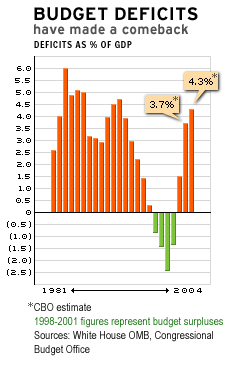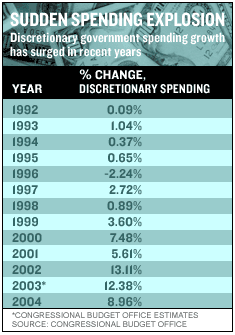NEW YORK (CNN/Money) -
Like a cowboy-boot wearing David Blaine, President Bush has promised to perform an amazing feat of prestidigitation: he's going to saw the whopping federal budget deficit in half in just five short years.
But some observers warn the budget proposal he will submit Feb. 2, which will include projections of a greatly reduced deficit by 2009, will be little more than smoke and mirrors -- unless he and Congress can show a lot more fiscal discipline than they have recently.

The Congressional Budget Office estimated Monday that the federal budget deficit would swell to $477 billion this year, a record in terms of the sheer number of dollars involved, amounting to 4.2 percent of gross domestic product (GDP), the highest level since a record 4.8 percent in 1986.
In his State of the Union speech last week and in other public appearances, President Bush and members of his administration have promised to cut that deficit in half by 2009 -- by spurring faster economic growth that will lead to higher tax revenue, and by Bush's pledge to hold the line on spending.
But Bush hasn't offered any more specifics for cutting the deficit, and -- according to some analysts -- what plans he has proposed seem more likely to grow the deficit, including:
- making tax cuts permanent
- privatizing Social Security
- establishing a permanent base on the moon, followed by manned missions to Mars
- tax credits for health insurance
- worker training programs
- prisoner rehabilitation programs
"With all these new programs, the administration's contention that the deficit will be cut in half in the next five years is a tall tale, derived in large part by omitting very likely or inevitable costs, including costs for proposals the administration itself hopes and intends to support," Keith Ashdown, spokesman for Taxpayers for Common Sense, a Washington watchdog group, wrote recently.
| Related stories
|

|
|
|
|
Ashdown told CNN/Money that, while the Mars proposal could very well be killed -- a "sacrificial lamb" to appease fiscal conservatives -- the president's budget will also not include the impact of a transportation bill that could cost as much as $375 billion and could be passed this year.
Ashdown and others also noted that Bush's budget will not include any more spending for the war in Iraq and the continuing U.S. involvement in Afghanistan. Instead, Bush is likely to delay asking for that money until after the election. Some analysts have estimated such costs will be about $50 billion or more a year.
| 
| |

| 
| 
|

|
 Jeremy Siegel of Wharton School of Business talks about budget deficits and whether tax cuts were a mistake. Jeremy Siegel of Wharton School of Business talks about budget deficits and whether tax cuts were a mistake.
|
 Play video
Play video
(Real or Windows Media)
|
| 
|

|
|
The budget also will not include the effect of reforming the alternative minimum tax (AMT) to cut the number of people it affects, which the CBO has estimated will add $172 billion to the deficit through 2009. Such a reform is likely to be passed, according to many analysts.
Meanwhile, the liberal Center on Budget and Policy Priorities, a Washington think tank, warns Bush may not include increased spending for a future Pentagon build-up and anti-terrorism efforts, noting he excluded such costs from his last budget proposal.
"The administration's forthcoming budget is expected to have approximately $200 billion in missing costs in the fifth year," CBPP analysts Richard Kogan and Martha Coven wrote recently. "Once these missing costs are taken into account, the deficit is seen as being in the range of $500 billion in 2009, or around 3.5 percent of GDP. That is not close to cutting the deficit in half."
'Fiscal child abuse'
The CBPP and many Democrats say the tax cuts passed by Congress and pushed by Bush the last three years are responsible for much of the current fiscal mess. All of the Democratic presidential candidates call for rolling back at least the tax cuts for the wealthy.
Some conservatives, on the other hand, say the tax cuts should stay in place, claiming they'll help to narrow the deficit, and that spending should be cut instead.

To appease them, Bush has promised to hold growth in discretionary spending outside of defense and homeland security -- stuff like agriculture and education -- to just 1 percent in 2005. This promise was met with skepticism by some conservatives, who noted that such spending makes up less than 20 percent of total government spending.
"If everything else grows super-fast, and such a small portion of the budget grows at 1 percent, big deal," said Veronique de Rugy, a policy analyst at the Cato Institute, a fiscally conservative think tank in Washington. Congress will likely authorize more spending than the president proposes, anyway, she said, noting it has in recent years.
She also scoffed at Bush's pledge to hold total discretionary spending growth to just 4 percent, noting that Bush's father and President Clinton were able to keep such spending growth lower and even to cut it in some years.
What's more, spending on Social Security and Medicare -- "mandatory" budget expenditures -- will skyrocket by the end of the decade, as millions of baby boomers begin to retire, de Rugy and other analysts say.
"This is like running up a credit card debt and asking our kids to pay for it in the future -- it's fiscal child abuse," de Rugy said.
Tough political choices
Some analysts doubt the problem can be solved simply by raising taxes or cutting spending -- both may be necessary. U.S. comptroller general David Walker, a Republican, said last week that Social Security and Medicare growth would have to be cut, along with other spending, and that some taxes might have to be raised, in order to contain the deficit.
YOUR E-MAIL ALERTS
|
Follow the news that matters to you. Create your own alert to be notified on topics you're interested in.
Or, visit Popular Alerts for suggestions.
|
|
|
 |
Some observers have said deficits don't matter, noting the economy survived enormous deficits under President Reagan, and claiming the economic boom of the 1990s may have been due, in part, to deficit spending.
But Reagan, the first President Bush and President Clinton all raised taxes in different ways to help stem the deficits, while Congress kept spending growth tightly under control during the first Bush and the Clinton administrations.
And considering the looming obligations under Social Security and Medicare, deficits could grow much larger and become much more economically risky in future years, if corrective measures aren't taken soon, according to recent studies by the International Monetary Fund, the Brookings Institute, a liberal think tank, and Goldman Sachs.
"It defies common sense and lots of careful research to think that the highest-rated credit on the planet can borrow half a trillion dollars a year without pushing aside some private investment and ultimately hurting productivity growth," Goldman Sachs economist Ed McKelvey wrote in an oft-cited research note in November.
But since the necessary remedies are politically unappetizing -- especially in an election year -- the deficit will likely keep growing, McKelvey wrote, slowly but steadily undermining the economy's growth potential.
"The real problem is that the effects on growth and productivity are corrosive rather than catastrophic," he wrote. "This is why the deterioration in federal finances is so insidious."

|